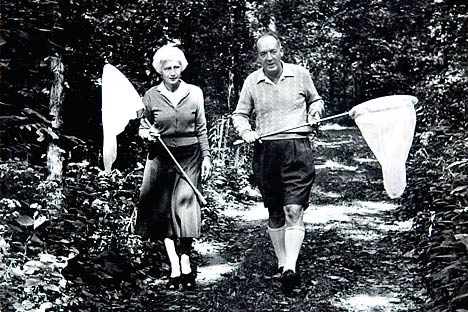Nabokov's butterflies
Share

Vladimir Nabokov is best known for Lolita, the novel that scandalised thousands of readers in the 1950s and 1960s. What is less well known, Mary Ellen Hannibal suggests in the journal Nautilus, is that Nabokov’s lifelong interest in butterflies had a strong influence both on the novelist in general and on his best-selling novel in particular.
Having fled Russia in1919, Nabokov studied zoology at Cambridge University and eventually settled in the United States. Lepidoptery (the study of butterflies and moths) was a constant source of comfort and enjoyment to him during his turbulent early life. He acknowledges this in his autobiography Speak, Memory, recalling that it was at the childhood home of Vyra, on the outskirts of St Petersburg, that he learnt the correct technique for netting the delicate insects, as well as the right methods for preserving and displaying them under glass.
Later, in the US, Nabokov's continued enthusiasm for butterflies prompted him to make long journeys with his wife Vera as his chauffeur (he never learnt to drive). This exposed him to the middle-American landscape of motels, diners and freeways, and lepidoptery was eventually translated into one of his protagonist Humbert Humbert's favourite activities in Lolita. Brian Boyd, the author of Nabokov's Butterflies (2000) believes that were it not for Nabokov’s interest in butterflies, America itself might never have appeared in such sharp focus in the author's work.
In her report, Mary Ellen Hannibal notes that it is only in the past few years that Nabokov's work in the field has been reappraised as a serious contribution to science – he published 18 papers on the subject – and not just the enthusiastic writings of a hobbyist. In the same way (largely in response to Boyd's book) butterflies are increasingly thought to have been a key motivation for his literary work, rather than merely an entertaining diversion. It was certainly a pursuit he pursued with passion: if he hadn't been forced to leave Russia, he once said, he might never have turned to fiction, but remained content with a net, a few glass cases, and his beloved insects.

Mary Ellen Hannibal's article 'Speak, Butterfly', appeared in Nautilus on December 19th, 2013
